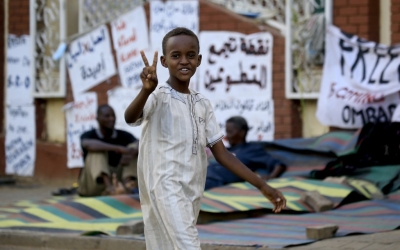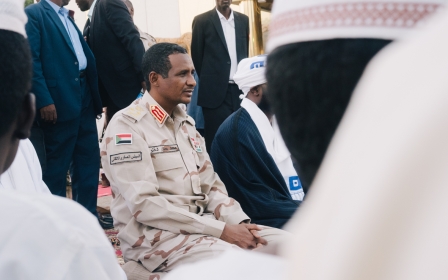Sudan military scraps transition deal and calls elections after deadly crackdown

Sudan's military on Tuesday cancelled a power-transfer agreement with protesters and called for elections within nine months, a day after forcefully breaking up a weeks-long sit-in, leaving 35 dead in the capital Khartoum.
The Transitional Military Council (TMC) ousted president Omar al-Bashir in April after months of protests against his authoritarian rule and had agreed a three-year transition period to a civilian administration.
But army chief General Abdel Fattah al-Burhan, the head of the TMC, announced in a televised statement the plan had been ditched and an election would take place under "regional and international supervision".
"The military council decides on the following: cancelling what was agreed on and stopping negotiating with the Alliance for Freedom and Change, and to call for general elections within a period not exceeding nine months," Burhan said.
Madani Abbas Madani, a leader of the Declaration of Freedom and Change Forces opposition alliance, said a civil disobedience campaign would continue to try to force the council from power.
The opposition rejected all that Burhan said in his statement, Madani said.
"What happened, killing protesters, wounding and humiliation, was a systematic and planned matter to impose repression on the Sudanese people," he said.
The Sudanese Professionals Association (SPA) also called on demonstrators to take part in "total civil disobedience" to topple the military council.
It asked people to go out on Tuesday to hold Eid prayers to mark the end of Ramadan, "pray for the martyrs" and then "demonstrate peacefully".
Heavily armed members of the paramilitary Rapid Support Forces (RSF), who were at the vanguard of breaking up the sit-in, were deployed around the capital on Tuesday, guarding entrances to the bridges that cross the Nile, and moving in convoys around the city.
RSF vehicles were also seen patrolling the streets in Omdurman, on the other side of the River Nile from Khartoum, and firing into the air.
'Civil war'
A senior protest leader told the UK's Sky News that the country was on the verge of descending into civil war, with some army officers ready to march on Khartoum to support the civilians.
Dozens of demonstrators were killed and hundreds more wounded on Monday in the bloody crackdown outside Khartoum's army headquarters, which was met with sharp international condemnation.
The SPA accused the TMC of perpetrating "a massacre" as it broke up the camp, a charge denied by the council.
Sudan's protests: A brief timeline
+ Show - HideSudanese protests have evolved in the space of less than six months from complaints about bread prices to calls for long-term leader Omar al-Bashir to go and demands for a civilian-led transition to democracy.
Here's a summary of the key moments so far since the protests began.
19 December 2018: People take to the streets in the city of Atbara to protest against a government decision to triple the price of bread, torching a local ruling party office. By the next day protesters on the streets of Khartoum and other cities calling for "freedom, peace, justice". Police try to disperse the crowds, resulting in at least eight deaths. Dozens more will be killed in the weeks of protest that follow
22 February 2019: Sudanese President Omar al-Bashir declares a nationwide state of emergency. He swears in a new prime minister two days later, as riot police confront hundreds of protesters calling for him to resign
6 April: Thousands gather outside the army's headquarters in Khartoum, chanting "one army, one people" in a plea for the military's support. They defy attempts by state security forces to dislodge them and troops intervene to protect them
11 April: Military authorities announce they have removed Bashir and that a transitional military council will govern for two years. Despite celebrations at Bashir's demise, protest leaders denounce the move as a "coup" and the protesters remain camped outside army headquarters.
14 April: Protest leaders call on the military council to transfer power to a civilian government
20 April: Sudan's military rulers hold a first round of talks with protest leaders
27 April: The two sides agree to establish a joint civilian-military ruling council, but talks stall over differences in the composition of the council, with both sides demanding a a majority
15 May: With negotiators reported to be close to agreeing a three-year transition to civilian rule, military leaders suspend talks and insist protesters remove barricades outside the army's headquarters. Talks resume on 19 May but break down again on 20 May, with the opposition insistent that a civilian must head the transitional governing body
28 May: Thousands of workers begin a two-day strike to pressure the military rulers and call for civilian government
3 June: At least 35 people killed and hundreds injured, according to opposition-aligned doctors, as security forces firing live ammunition move to disperse the protest camp outside army headquarters
4 June: General Abdel Fattah al-Burhan, the head of the military council, announces that all previous agreements with protest leaders are scrapped and says elections will be held in nine months
TMC spokesman Lieutenant General Shams El Din Kabbashi said security forces were pursuing "unruly elements" who had fled to the protest site and caused chaos.
The Alliance for Freedom and Change announced "the end of all political contact and negotiations with the putschist Council" following the deaths.
'Brutal' crackdown
The United States called it a "brutal" crackdown on protesters, who want the generals behind the overthrow of Bashir to hand over to civilian rule.
UN Secretary-General Antonio Guterres condemned the excessive use of force against protesters and called for an independent investigation.
The UN Security Council will meet behind closed doors on Tuesday to discuss Sudan, after Britain and Germany requested the talks, diplomats said.
The Central Committee of Sudanese Doctors, which is close to the protesters, said the "massacre" toll had risen to 35, with 116 wounded.
An eight-year-old child was among those killed, it said, and called for "urgent support" from humanitarian organisations to help the wounded.
Footage from the Royal Care hospital earlier in the day near the site of the sit-in showed people on the floors of the wards receiving treatment as men in uniforms sitting in pickup trucks gathered outside.
An AFP correspondent said the streets of the capital were largely empty Monday night, a time the city is usually busy.
Some streets were blocked off by demonstrators who had erected barricades made from stones, tree trunks and burning tyres earlier in the day.
Many shops and businesses were shuttered around the city.
The doctors' committee said forces had opened fire inside the city's East Nile Hospital and had chased "peaceful protesters".
Rallies against Bashir's authoritarian, three-decade rule led to his overthrow in April, but protesters had remained outside the army headquarters calling on the generals to cede power to a transitional authority.
Middle East Eye delivers independent and unrivalled coverage and analysis of the Middle East, North Africa and beyond. To learn more about republishing this content and the associated fees, please fill out this form. More about MEE can be found here.







